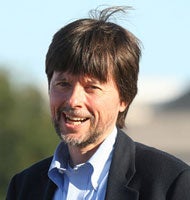Celebrated filmmaker Ken Burns was joined by writer and collaborator Geoffrey C. Ward, cultural critic Stanley Crouch and Harvard Kennedy School professor Edward Schumacher-Matos in an October 29th Harvard Law School panel discussion on the role of race in Burns’ documentaries as well as the role of those documentaries in shaping future American societies.
The panel discussion, hosted by the Charles Hamilton Houston Institute for Race & Justice and moderated by HLS Professor Charles Ogletree, ’78, centered on Burns’ films, with a number of clips being shown over the course of the evening. The selected clips were drawn from works going as far back as Burns’ 1985 film Statue of Liberty and up to more recent documentaries such as 2004’s Unforgiveable Blackness: The Rise and Fall of Jack Johnson. This latter film was of particular interest to the panel in light of recent congressional efforts to secure a posthumous presidential pardon for the boxer, the first black Heavyweight Champion of the World. Burns’ documentary is considered to have been the driving force behind these efforts.
Saying the laws of the Jim Crow era were “the cancer that was killing the country,” Burns referred to racism as “our original sin” and an issue at the center of every story in American history. He added that he would continue to raise the issue in his projects, including his upcoming film on the Central Park Jogger Case of 1989.
Referring to this upcoming film—which details the recently-overturned convictions of five black and Latino youth for a violent crime they did not commit—Professor Ogletree posed the question: “Will this documentary change minds?” Speaking more broadly, Ogletree asked “Can films make people do anything?” Though the experiences and backgrounds of the panelists vary widely, the members were unanimous in their response: absolutely.
–Anthony Lux
